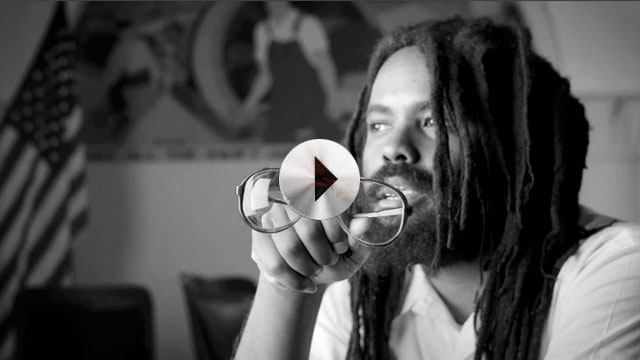LIES
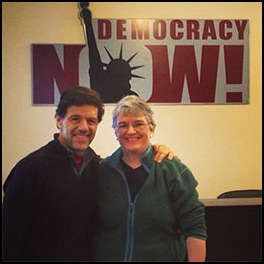
By Noelle Hanrahan and Stephen Vittoria
(Philadelphia and Los Angeles)
Mark Twain once wrote that, “There are lies. There are damned lies. And then there are statistics.” With apologies to Mr. Clemens but when it comes to Mumia Abu-Jamal “There are lies. There are damned lies. And then there’s the State of Pennsylvania and the City of Philadelphia” – the so-called City of Brotherly Love. It’s a metropolis the march of history documents as one of the most ruthlessly racist cities in America – and never has that been more apparent than during the current disingenuous backlash on the Debo Adegbile nomination process. It’s been nothing less than a “flash mob” attack on a distinguished attorney and the man he defended.
When Adegbile headed the NAACP’s Legal Defense Fund and was part of Abu-Jamal’s legal team, we believe the Sixth Amendment to the U.S. Constitution was still in force – it reads:
In all criminal prosecutions, the accused shall enjoy the right to a speedy and public trial, by an impartial jury of the State and district wherein the crime shall have been committed, which district shall have been previously ascertained by law, and to be informed of the nature and cause of the accusation; to be confronted with the witnesses against him; to have compulsory process for obtaining witnesses in his favor, and to have the Assistance of Counsel for his defense.
No story. No controversy. Nothing. An attorney defended his client. But the great lovers of America somersault into your living rooms ranting about how diabolical and abhorrent this lawyer truly is as they charge him with the unspeakable act of defending his client. Clearly this isn’t about the right to counsel. It’s about race and it’s about class. Remember, law is politics by other means.
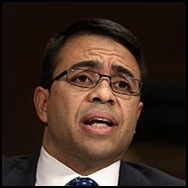
The ruckus over the United States Senate’s cloture vote on Adegible’s nomination began in the wake of his clearing the Judiciary Committee. According to an Op-Ed in the Wall Street Journal, Adegbile’s representation of Mumia Abu-Jamal was reason enough to derail his confirmation. The Fraternal Order of Police, Fox News (aka the Cartoon Network), and bipartisan derision from Pennsylvania politicians like Republican Senator Pat Toomey and Democrat Bob Casey fueled this manufactured drama.
It is a drama where U.S. Senators and political pundits regurgitate blatant lies that seek to demonize Abu-Jamal because they face zero accountability regarding their use of the purported “facts.” Try this one on for size: this past week, in another Op-Ed in the Philadelphia Inquirer, Toomey writes (or whoever writes his public statements), “And when Danny Faulkner's blood-stained shirt was displayed at trial, the jury saw Abu-Jamal turn in his chair and smirk at Faulkner's young widow.” Horrible, right? Except it never happened. Court records prove that the day Faulkner’s “blood-stained shirt” was introduced in the courtroom, Abu-Jamal wasn’t there – yet this story has been repeated time and time again. You tell a lie long enough and it becomes the truth.
Here’s another fact: When court reporter Terry Maurer-Carter came forward and swore in an affidavit that Albert Sabo, the original trial judge, boasted in chambers to another judge, “I’m going to help them fry the nigger,” Philadelphia Common Pleas court judge Pamela Dembe ruled it “irrelevant,” and that Sabo’s statement was not an indication that the case was racially biased. As Bob Dylan wrote years ago: “Couldn't help but make me feel ashamed to live in a land where justice is a game.”
The media and congressional pundits deplore that Abu-Jamal's death sentence was overturned and that he was removed from death row. They repeatedly attribute this result to the advocacy lawyers who they claim put forward a fabricated tale of racial bias. Come now, really? Racial bias in the U.S. Criminal Justice system? Racial bias in Philadelphia? Philadelphia? – the city where the Liberty Bell rests on the dirt that covers George Washington’s slave quarters? “Philadelphia has a veneer of liberalism and this whole Quaker mystique,” says long-time journalist Linn Washington. “The reality is it’s been this ruthlessly racist city from its inception.” Frederick Douglass agrees: “There is not perhaps anywhere to be found a city in which prejudice against color is more rampant than in Philadelphia.” In 1899, the great W.E.B. Du Bois reached the same conclusion in his classic work “The Philadelphia Negro” – the first sociological study of black people in America. Add in the corrupt shenanigans of Frank Lazarro Rizzo along with the city-state-and FBI domestic bombing of the MOVE home in 1985 (11 Americans murdered including 5 children) and it’s easy to see why race matters in Philadelphia.
The media and congressional pundits also conveniently ignore that Abu-Jamal's death sentence was overturned by an American court: the U.S. Third Circuit and that decision was upheld by the United States Supreme Court – hardly a bastion of radical enlightenment.
But why is Abu-Jamal relevant at all? Why are those on the screaming right so concerned if he lives or dies? Why is the vast majority of those on the left so silent regarding justice for Abu-Jamal? What does he represent that threatens them so deeply? What the hell are they so afraid of? The venerable Dick Gregory summed it up this way: “One day we will find out that he was the voice of America – the voice of America is a fraud.” There’s also something deeper at work here, something that would reveal yet another miscarriage of justice. By shining a bright light on the fraudulent arrest, prosecution, conviction, and death sentence of Mumia Abu-Jamal, the U.S. justice system will once again be exposed as the class and race driven scheme that it is now… and always has been. And let’s not forget how many in the Philadelphia establishment made their careers on Abu-Jamal’s case.
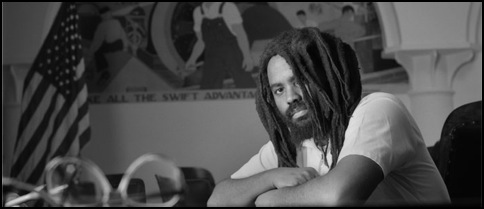
Plain and simple, Mumia Abu-Jamal is an internationally acclaimed public intellectual who writes in the tradition of Franz Fanon and Howard Zinn. The fact that he’s accomplished what he has from a Pennsylvania prison cell over the last 33 years (30 of which were spent in solitary confinement on death row) is nothing short of remarkable. The one-time journalist for National Public Radio and “All Things Considered” has written seven books from death row as well as 3,000 radio commentaries. His weekly worldwide broadcasts and bestselling books have been translated into nine languages.
The late Nelson Mandela, along with the European Parliament, Maya Angelou, E.L. Doctorow, Amnesty International, Alice Walker, Cornel West, and many others have called his trial a miscarriage of justice while at the same time celebrating his incisive writing. Abu-Jamal is also dangerous to the status quo because his work directly challenges the false but convenient “we have realized the dream narrative” that everyone from Time Magazine to Obama is promulgating as the country embraces the safe “I have a dream” Rev. Dr. Martin Luther King, Jr. and not the revolutionary “greatest purveyor of violence in the world today: my own government” Rev. Dr. Martin Luther King, Jr.
The United States government, along with their lapdogs in the press, has consciously and deliberately attempted to suppress the hopes and dreams of many Americans; for African Americans the road has been harsher, bloodier, and more brutal. Whether it’s comfortable or not to admit, the “dream” was assassinated by a host of culprits. But Mumia Abu-Jamal has survived. To those who aren’t afraid of the truth, the continued demonization and incarceration of Mumia Abu-Jamal remains just another stain on the unfortunate canvas of America.
❖ ❖ ❖
Noelle Hanrahan is the Director of Prison Radio and producer of the 2013 documentary “Mumia: Long Distance Revolutionary.” Stephen Vittoria is the writer, director, and producer of “Mumia: Long Distance Revolutionary.”
Boston Strong?

Written by Stephen Vittoria
(Los Angeles)
Rather than stand behind the dedicated men and women of Steelworkers Local 8751 – the Boston School Bus Drivers Union – the Mayor of Boston, along with the notorious transnational union-busting corporation Veolia, helped to orchestrate the demolition of union leadership, further weakening the rights of rank and file members. It was union busting at its worst and it’s become an all-too common practice in America as we watch corporations line up at their gluttonous trough while unions suffer.
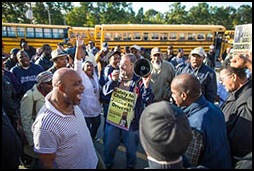
In a show of solidarity, union workers throughout Boston (and throughout the U.S., Latin America, South America, and elsewhere) have stepped up to support their brothers and sisters as they fight another corrupt machine for their rights.
On Friday, November 1, “Mumia: Long Distance Revolutionary” was scheduled to screen in Boston. The Boston premiere of the film at Hibernian Hall was organized and sponsored by the Boston School Bus Union and the Women’s Fightback Network. At 10am that morning, the leadership of the union was fired by Veolia.
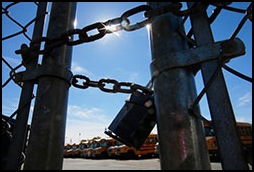
Late that evening after the Boston premiere, I received an email from Steve Gillis, one of the organizers (and now one of the School Bus Union 5) and he reported that three hundred people packed the hall and celebrated the life and revolutionary times of Mumia. In part, his email reported:
“You should know that your film reached deep into Boston's most oppressed communities last night, and that it did what only truly great film can do, provide a centerpiece and catalyst for new thought and vision about a better world, and how to move forward toward that goal.”
Steve’s note to me meant a great deal. It’s why filmmakers should make documentaries – that moment when you realize your work touched a nerve and offered some truth, some hope, and some inspiration to others.
Also, our thanks to Miya X, Chuck Turner, Andre Francois, and Monica Moorehead, who all spoke at the event – their longtime support of Mumia Abu-Jamal and his struggle for freedom inspires me.
For more information and how you can help:
http://bostonschoolbus5.org
American Bullshit

Written by Stephen Vittoria
(Los Angeles)
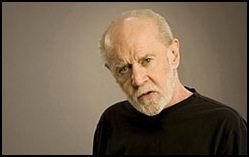
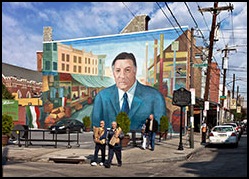
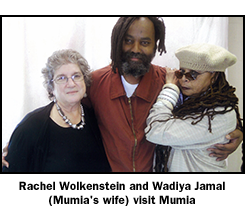
The theft of Mumia’s freedom, and the destruction of his life, began in the early morning hours of December 9, 1981 when the Philadelphia Police Department – and later the District Attorney’s office – began to literally manufacture Mumia’s guilt… and in the wake of their nefarious and reprehensible actions we find his innocence, concealed and buried beneath a mountain of lies. Working closely with Mumia’s long-time attorney, legal consultant, and his sister-in-arms Rachel Wolkenstein, I made this short film, Manufacturing Guilt, for one reason and one reason only: to counter the fabrications, the myths, the oft-repeated falsehoods, and of course the outright lies regarding this wicked and despicable miscarriage of justice.
Based on the actual record of investigations and court filings from 1995 to 2003 - evidence denied in the courts and ignored by the press - Manufacturing Guilt details the astonishing efforts of the Philadelphia Gestapo along with Ed Rendell’s DA's office to frame him for a crime he clearly did not commit – the murder of Daniel Faulkner.
Mumia Abu-Jamal doesn’t deserve a new trial. Mumia Abu-Jamal deserves to be set free immediately, right now. Yesterday in fact… because the facts of this case will make a dumb man smart. To paraphrase Bob Dylan – all the facts in this case add up to one big truth: that Mumia Abu-Jamal is an innocent man existing in a living hell. The film is unequivocal in its force regarding Mumia's innocence because the facts are equally unmistakable. It is truly an eye-opening experience.
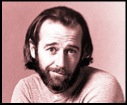
Imagine

Written by Stephen Vittoria
(Los Angeles)
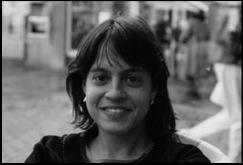
Too few of us, when we ride that bus to the statue on the hill, even notice the chasm between opulence and misery, even fewer have a crisis of conscience. If you know anything about Mumia Abu-Jamal, you already know this: when he rode the bus to the statue on the hill, the images of opulence and misery rocked his world and a crisis of conscience took deep root in his soul.
Liberation theology – the political and spiritual movement that understands the teachings of Jesus Christ as an emancipation from the repressive reality of unjust political, economic, and social tyranny – has come under attack from the sadistic gatekeepers of Christendom and their armed forces employed by the American Empire. Liberation theologians and those who become naturally aligned with the justice they offer are attacked as being Marxist and communist and because these movements have dared to challenge the status quo, also known as predatory capitalism. Liberation theology, and those who subscribe to its compassionate tenets, see injustice through the eyes of the poor and then struggle to demolish the ties that bind. For a crash course, check out the murderous U.S. actions that have wrecked havoc throughout Latin America over the past countless decades, especially at the hands of the Central Intelligence Agency (read “Masters of War” by Clara Nieto, experience your government and tax dollars at work).
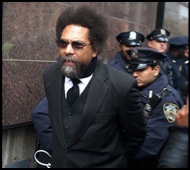

But this past week they did. Chris told me, “Steve, it was, as you might expect, very moving. Watching Mumia being affirmed with such enthusiasm and passion by two of the greatest African-American intellectuals in the country was, for me, a powerful and special moment. Mumia was crying when we left.” Then today (Wednesday, May 15), Chris Hedges was a guest on Pacifica’s DemocracyNow and Amy Goodman asked Hedges about his recent visits with Julian Assange and then his visit with Mumia. Chris said:
“I think the courage of a Manning, the courage of an Assange, the courage of a Mumia – I mean, how that man remains unbroken. I was there with Cornel West and the theologian James Cone. I mean it was a privilege for me. I mean, three of probably the greatest African-American intellectuals in the country, and certainly radicals. It’s those people who hold fast to the kind of moral imperative, or hold fast to the capacity for dissent, whether that’s Manning, who exhibited—I was in the courtroom when he read his statement—tremendous courage, poise, whether that’s Assange, whether that’s Mumia, let’s look at where all those three people are, because for all of us who speak out, that’s where they want us to be, as well. And that gets back to this AP story, because that is exactly the process that we are undergoing and where—if they win, where we’re headed.”
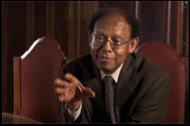
Imagine.
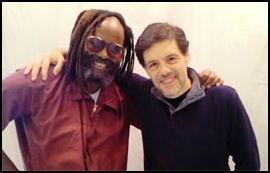
Imagine. It’s easy if you try.
The Hat Trick

Written by Stephen Vittoria
(Washington, D.C.)
When it comes to the film showing around the country, three cities have especially significant meaning in terms of what they represent to Mumia Abu-Jamal’s story as well as his career-long critique of the American Empire: Beverly Hills, Washington D.C., and of course the so-called “City of Brotherly Love,” Philadelphia.
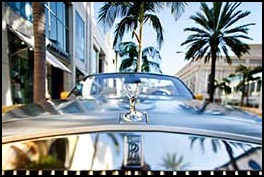
When we knew we were opening in Los Angeles, my home, we had a choice of various locales. As you know, LA sprawls out forever. We chose the Laemmle Music Hall in Beverly Hills because more than any other theater it was centrally located and it’s a great old venerable theater with a giant marquee – and on March 1 it advertised “MUMIA.” Then it hit me: Mumia (the long distance critic regarding the inherent evils of capitalism and class oppression and how wealth skews the reality of the human condition) is headlining at the theater that’s right in the heart of a city that symbolizes the opulence of greed and avarice… the materialism that warps the soul and buries our goodness even deeper beneath the surface. Plain and simple: Beverly Hills is the iconic representation of financial gluttony.
When I told Mumia about the play date in Beverly Hills on the main artery that dissects Tinseltown, that “Long Distance Revolutionary” was opening in the playground of those who just lavished praise and gold on two myths (Lincoln & Argo) at their masturbatory Academy Awards, he had a long and hearty laugh.
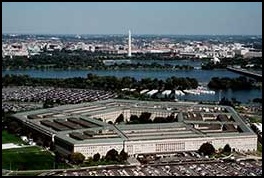
Playing Washington D.C. was also über important because it positions the critique of Empire and all its associated murderous tendencies right in the belly of the beast of New Rome… and the audience embraced the film, the story, Mumia, and the critique of the American mandarins with inspired passion.
One of my journalistic heroes, Dave Zirin, was in attendance (he’s also in the film) and began the Question & Answer session with an impassioned statement about the importance of the film and that LDR was a much-needed alternative look at Mumia’s life that rightly focused on the magnitude of his journalistic wherewithal. That meant a great deal to me.
DC was also a triumph because Eisa Nefertari Ulen’s piece in yesterday’s Washington Post was incredible – she got the film in a way that restores (for a nanosecond) my faith in the Fourth Estate – albeit a government-run entity. I guess this outstanding look at the film slipped through the proverbial cracks. Thanks Eisa.
My only regret in DC is that the current resident triggerman in the White House didn’t stop by. He needs to see the film. Badly.
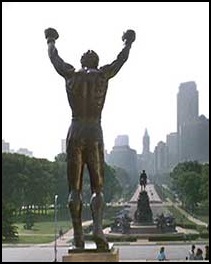
On May 3, this Friday, at Landmark Theater’s “Ritz at the Bourse,” Philadelphia’s native son, Mumia Abu-Jamal, once known as Wesley Cook, comes home… this time with his life story intact, unabridged, and sans the lies, innuendo, and mythical gibberish. This is the city where on 9 December 1981 lives changed forever. It is a day that will live in infamy, especially between the Delaware and Schuylkill rivers, between Germantown to the west and Holmesburg to the east.
In many respects, May 3 – the day “Mumia: Long Distance Revolutionary” opens in Philadelphia – is a day of reckoning for a kid friends called Wesley, and for a man we now call Mumia. No t-shirts, slogans, bumper stickers, or yelling – either in support of or with malicious intent. It’s a story about courage, about overcoming the repressive apparatus of forces hell-bent on enslaving the human spirit. Ultimately, it’s a story that offers an alternative to Beverly Hills (avarice), Washington D.C. (Murder Incorporated), and Philadelphia, Pennsylvania (lies).
A Long, Gratifying, and Hearty Laugh

Written by Stephen Vittoria
(Los Angeles)
Back when the film “Titanic” came out, LA Times film critic Kenneth Turan wrote a negative review of James Cameron’s sweeping love story set aboard the great ocean liner that ended up at the bottom of the North Atlantic on its maiden run. Cameron was so incensed with Turan’s review that he contacted the Times’ editors and called for them to fire the critic. C’mon, Jim, really? Fire the dude because he didn’t like your movie? Can’t handle a little criticism? You let Kenny Turan get to you? Say it ain’t so, Jimmy. You have all that money, all that fame, statues galore, you’re on your what? Fifth wife? People quake in your presence. And Kenny Turan rankles your feathers? Really?
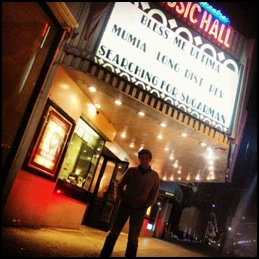
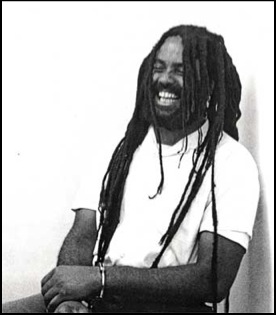
They say LA is where documentaries go to die - not this "Long Distance Revolutionary." When I told Mumia on the phone this week that his story was number one in the heart of the Empire’s myth-making machine and blocks away from Rodeo Drive – capitalism’s diamond ring – he had a long, gratifying, and hearty laugh. Audiences of all colors, shapes, and ages eschewed the mainstream naysayers and embraced an alternative narrative about their history and the current state of their country. That’s what gave Mumia so much joy – that his words are cutting through the embroidery of lies and myths that remain the foundation of America. His laugh echoed through the empty hallways of the American Empire.
Belly Of The Beast

Written by Stephen Vittoria
(Los Angeles)

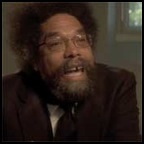
The biggest myth surrounding the state of mind known as “Hollywood” is the goofy right wing’s belief and bed-wetting yelps about those so-called “liberal Hollywood types” – Babs and Hanks and Spielberg and all the others who have been lining the pockets of the current trigger man in the White House for some time now. I guess murder and neo-liberal predatory actions are okay as long as your guy is in charge. If “Hollywood” is “liberal” then Attila the Hun is Gandhi. Sometimes there are those here who even fashion themselves as revolutionary warriors fighting for justice. Yeah, sure…
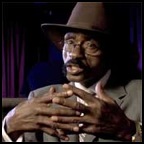
Which brings to mind an exchange in the film between Cornel West and Hurricane Carter. It kind of sums up the Empire’s myth making machine here on the Left Coast:
--
CORNEL WEST
Mumia is a very distinctive kind of celebrity. He’s a celebrity that calls into question the superficiality of most celebrities.
RUBIN CARTER
I wanted to go see Mumia for myself… and the next day I was going to fly on a private jet going to LA hoping, vainly it seemed, that Denzel Washington would win the Academy Award as the starring actor in the movie “The Hurricane.”
CORNEL WEST
You juxtapose Mumia Abu-Jamal with Oprah Winfrey… you know that is like John Coltrane and Kenny G. You know what I mean? It’s like, good god almighty, you got depth, tremendous sacrifice, willingness to bare any cost – that’s Coltrane, that’s Mumia Abu-Jamal.
RUBIN CARTER
The contrast between the two places was so extreme because there I was sitting with Mumia and he was daring to dream from Death Row.
CORNEL WEST
Oprah is an entrepreneurial genius, we know that, but thin, superficial, well adjusted to the injustice of society even as she surfaces.
RUBIN CARTER
And then the next day I rode in this private jet to Hollywood, you know to the plush limousines, the plush suits and dresses… and the empty eyes of Hollywood. Nobody was dreaming there.
CORNEL WEST
You never hear her talking about critiques of Wall Street. You never hear her talking about critiques of capital. You never hear her talking about the plight of poor people. You never hear voices on her show that allow that vision to be heard. Never. She is a success. American style.
--
American style indeed… Style over substance, myth over reality. That’s why it’s so poignant that “Long Distance Revolutionary” opens in LA right in the belly of the beast… but this isn’t unusual for Mumia: his courageous words and revolutionary actions have been targeting the heart of the American Empire since he was fifteen years old.
New York, New York (Part II)

Written by Stephen Vittoria
(at 36,000 feet)
Four years ago, I began walking down a road that I knew was right, that I knew was worthy, that I knew was winding its way toward the heart of justice. This weekend, in New York City – the island that sits hard between rivers East and Hudson – was home for our film “Mumia: Long Distance Revolutionary” – and rightly so. It is, after all, the center of the universe… so if Mumia’s tragic, joyous, and courageous story was to debut, it should be in the center of the universe… and debut it did.
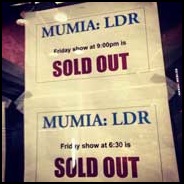
Some of the reviews from the mainstream press are precious in how obvious and predictable they can be. In fact, leading up to the release of the film, we were already speculating and bantering about what their critiques would sound like… “journalists” who rail against documentary filmmakers (and other independent journalists for that matter) for having the audacity to exhibit a strong point of view. It freaks them out. They throw around terms like agit-prop and hagiography to define a narrative that has the strength to stake a claim and then back it all up with undeniable facts, strong research, and incisive third-party credibility. They continue to enable the mythmakers to spin their vindictive venom about Mumia. These puppets would have told Frederick Douglass to shut up, just like they told Dr. Reverend Martin Luther King, Jr. to shut up when he called the U.S. Government “the greatest purveyor of violence on the planet.”
First newsflash: there are no objective documentaries or documentary filmmakers, or journalists, or historians. We are all influenced by a million factors and that influence molds the narrative. Filmmakers that say they have “no agenda” are lying to you. We all do – some of us just wear it on our sleeve. Ask Michael Moore.
And the best part of their pathetic attack is that they never attack the facts or the research or the salient moments in the film. Ask Julian Assange how much support he’s received from the so-called press. They don’t attack the veracity of the material he releases or the deadly consequences he’s trying to shine a light on, no – these fellow “journalists” attack his right to release the material, or more specifically, YOU’RE RIGHT TO READ AND KNOW ABOUT THE MATERIAL.
In the film, I offered a preemptive strike if you will to this type of “gate-keeping” by the corporate sell-out press:
“It’s interesting how mainstream journalists are never questioned when they’re embedded with troops or hob-nobbing at cocktail parties with generals and corporate criminals. In fact, the conglomerates that sell news never truly challenge the status quo... nor will they will ever speak truth to power.”
Journalist Amy Goodman has asked the rhetorical question that best puts these swine to sleep: “If we had state run media in this country, how would it be any different than what we have right now?” Right on, Amy.
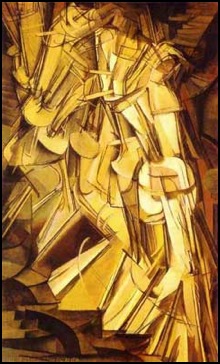
"No. I was delighted to be the ‘succes de scandal’ because for me it was a form of revolutionary action. You see if I were accepted with opens arms that would be the opposite of what I wanted...it wouldn't have fulfilled my intentions. After all, the idea of the Cubists at the time was to be entirely revolutionary and disturb completely every conception of art as it was accepted at that time. Upset the standards… In other words, you little by little get your own little group of people who are with you fighting the big mass against you."
So here’s a second newsflash for our beloved scribes: the audiences simply don’t care about the myth (and impossibility) of so-called objectivity. When given the opportunity to experience an alternative narrative like “Long Distance Revolutionary,” one that doesn’t toe the line of governmental and corporate approval, they gravitate to it with a passion rarely seen… because they know bullshit when they see it and they know the attack on Mumia’s character and story has been well-orchestrated and manipulated from the beginning. Hell, the mainstream press has had thirty years of unspoiled “fun” when it came to this story – a one sided narrative if there’s ever been one. So as Oscar Wilde suggested decades ago – the artist’s responsibility to history is to re-write it.
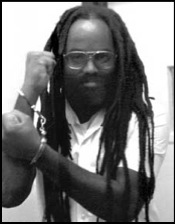
Now, here’s the intriguing part: the audience showed up… and they kept showing up. All weekend long – right through that masturbatory spectacle known as the Super Bowl. In fact, the film performed so well that the good folks at Cinema Village and First Run Features have held the documentary over for another week, until February 14.
And it’s easy to see why: Mumia’s story of victory, transcendence, and courage is also their story. They are connected in ways that the concrete walls of prison cannot stop. Poet Aya de Leon makes this infinitely clear in the third act of the film with her brilliant spoken word poem In the Flesh:
“No prison walls, cellblock iron bars, solitary hell-hole, death-row speech ban bullshit will ever, ever hold his spirit… There are forces stronger than the State of Pennsylvania and the governor, and there are forces stronger than bars and brick and barbed wire. Didn’t we shout with glee when you freed Geronimo Ji Jaga? Did I cry for joy when you freed Nelson Mandela? Let him be free- in the flesh.”
New York, New York

Written by Stephen Vittoria
(Somewhere over the Rainbow at 37,000 feet)
I have this dream. It’s February 1, 2013 and it’s in the city that sits hard between the rivers East and Hudson. It’s inside the historic Riverside Church, the place where the Reverend Dr. Martin Luther King, Jr. had arguably his finest moment – a moment when King became a superhero, a moment when King climbed on the back of empire and spoke bravely about the evils of capitalism, the evils of militarism, and of course the evils of racism. At Riverside Church in April of 1967, exactly one year before the day he was murdered in Memphis, King sharpened his pen and drove it right into the heart of the American Empire. He masterfully merged the various evils of his day – the murder spree in Southeast Asia, the bludgeoning of the poor by predatory capitalism, and the terror exerted for centuries by a racist nation – into one cohesive and connected message of peace and sanity for humankind. The so-called liberal press of the day – The New York Times, The Washington Post, Newsweek, and all the other fish wraps – eviscerated King in a barrage of vindictive fury. But King never missed a step. He withstood the hurricane winds of rage that whipped out of the white supremacist noise machine – for King knew, after climbing his mountain that the Empire had run amok. King knew that the battle lay before him.
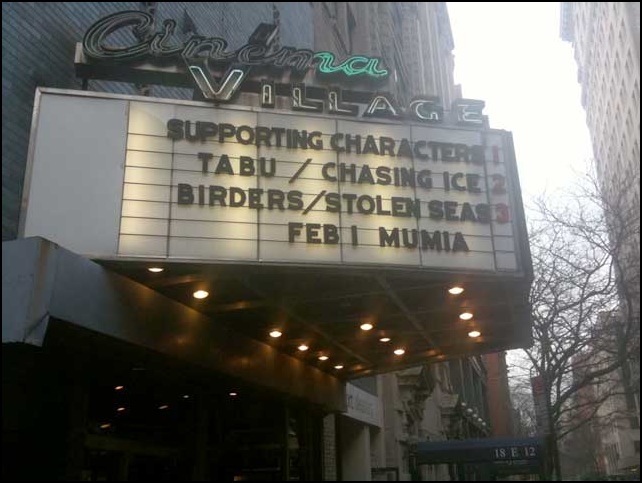
It is here where this dream materializes. Riverside Church, 1 February 2013… and in this dream the film “Long Distance Revolutionary” doesn’t exist. There is no need for it to exist because in the pulpit – the same pulpit King undressed the Empire forty-five years ago – stands Mumia Abu-Jamal. Fifty-eight years old. Dreads. Glasses. And of course rough and tumble clothes. His booming message to a packed chamber echoes and expands King’s denunciation of the Empire, of war, of poverty, of the injustices that plague this nation and this world. Like I said, in this dream, there’s no reason for a two-hour documentary because Mumia is a free man – there’s no need for a film to capture his life, his revolutionary fight, his courageous message, his rage against the machine. Because Mumia walks free and has been a current day Frederick Douglass for decades… an amalgamation of many great and courageous revolutionaries but in a style and manner all his own.
Also in this dream, America is a little bit better; the fight for healthcare, living wages, environmental justice, and the never-ending battle against war and violence is a little farther down the road. And we’re there because the powers that be have not silenced and shackled Mumia for thirty-plus years, the powers that be have not moved mountains to surgically remove his black presence, as well as his ability to fight and speak for others.
But the reality of February 1, 2013 is that Mumia Abu-Jamal is not free. He continues to exist – along with so many others – in a living and breathing hell. Indeed, his spirit runs free, his soul beckons the light, and his words are read and heard around the world by some, but his shackles, the ties that bind, the terror of thirty-plus years on Death Row, in solitary, marginalize and diminish his impact. History will recognize his impact but history can be cruel in its timing. It’s like what Dick Gregory says in the film:
“One day we will find out that he was the voice of America – the voice of America is a fraud.”
The dream, at least for this moment, is gone. Mumia remains inside what Cornel West calls, “a prison cell in the U.S. repressive apparatus.” But this dream turned nightmare has a temporary silver lining, a band-aid, a bridge loan for you economics majors out there… and it is “Long Distance Revolutionary,” opening in New York City this weekend, February 1 at Cinema Village in the most famous of villages.
Many believe the film is the definitive work on this man’s life. I’m honored when I read that because the narrative that has been perpetuated by the ugly and soulless mainstream public relations machine – also known as the American media – has been a mix of racist lies and outright gibberish.
The corrupt swine may have effectively silenced and unplugged Mumia’s full potential as an agent of revolutionary change, but not this weekend, not this week in the greatest village in the greatest city on earth, the center of the universe, hard between rivers East and Hudson.
Warriors For Justice

Written by Stephen Vittoria
(37,000 feet – Newark to Los Angeles)
Where to start?
I guess this long nightmare must start in the early morning hours of 9 December 1981. Lives were changed forever: Patrolman Daniel Faulkner, his young wife Maureen, their families, and then of course the subject of my new documentary, Mumia Abu-Jamal, and his family. Any semblance of innocence for all of these terrestrial children was abruptly jettisoned out into the cosmos, launched from a cold and harsh Philadelphia night. The victims of this tragedy were pitted against each other long before any of them were even born – unwitting players in an ugly American passion play.
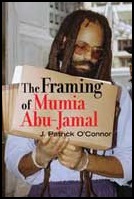
After recovering from his gunshot wounds and surgery, Mumia wrote an essay entitled "A Christmas Cage." In it, he describes the beatings he suffered at the hands of the Philadelphia police on the night of his arrest.
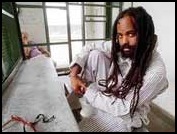
This tragedy – like most tragedies – has many lives. Hatred, fear, and the human inability to rise above the ugly complexities of a society and culture in decline (think “entropy”) are the fuel canisters that keep this tragedy burning.


And where does the blame for this horror story lie?
Right at the feet of the Philadelphia political power structure that built their careers on the pain, suffering, and torture of Mumia Abu-Jamal. This group of Machiavellian snakes slithered out from under the foundational bedrock of American racism and went to work using the age-old tools of hatred and fear. This modern day lynch mob, by-products of a white supremacist culture and backed up by centuries of racist fear mongering, let slip the dogs of war, easily manipulating the victims, the press, as well as the court of public opinion – all of whom are co-conspirators in this miscarriage of justice. They lied. They fabricated. And worst of all, they won. They beat the truth, they beat mercy, and they beat forgiveness – the three things they waste their time supposedly searching for in their vacuous houses of worship.
I tell you all of that to tell you this.
Because there’s a group of dedicated, committed, and steadfast warriors who have been fighting for Mumia Abu-Jamal’s freedom for all these years… all these years he was “chained” in the hole on death row, his own Middle Passage… all these years that he has fought the corrupt machine that is attempting to eat him alive, this pack of opportunistic cannibals that have stolen his life, his children’s lives… all these years that he has existed in hell. Like I said, there’s a lot of tragedy to go around – on both sides of 9 December 1981.
But oh these warriors… they are unswerving in their drive to free this innocent man. I’m reminded of what Gabriel Bryant (a student from Temple who is interviewed in the film) called this somewhat amorphous group of freedom fighters during his interview – “warriors for justice.” Indeed.
So on Saturday night, the eve of the “anniversary” of 9 December 1981, there was a remarkable screening of “Long Distance Revolutionary: A Journey with Mumia Abu-Jamal” at Temple University in Philadelphia. The Department of African American Studies and Dr. Tony Montiero invited us to screen the film for some 600 students, activists, community leaders, as well as the general public. It was the last special screening before the film opens in theaters on February 1, 2013.
The giant theater was packed. There was electricity in the room. You could cut the anticipation with a knife. And we played the film… and this large group of tenacious “warriors for justice” embraced every moment of Mumia’s extraordinary life – from his days fighting the good fight on the streets of Frank Rizzo’s Fiefdom to his days fighting the same good fight from solitary confinement, always the “voice of the voiceless.”

For years, this group of unyielding warriors has fought for truth and justice, and for years they have been pummeled by a corrupt and monstrous machine… but they are not beat. No way. Far from it. They will not rest until this ugly and cancerous strain of racism that inflicts this country and their city is lifted and Mumia Abu-Jamal is a free man.
Even Playing Field

Written by Stephen Vittoria
(Philadelphia)
Today, for five very plugged-in hours, Chris Hedges and I visited Mumia Abu-Jamal at the State Correctional Institution at Mahanoy, a dank prison buried deep in the woods of eastern Pennsylvania. First, a bit about Chris…
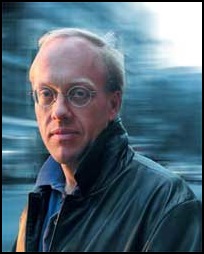
Back to SCI Mahanoy on a rain-drenched, 33 degree December day. As we’re checking in, it dawns on me: I’m starting to get to know the guards. I’m not sure if that’s good, bad, or just normal. Me: “Hey, how you doing? Him: “Good. Jamal?” Me: “Yeah, AM8335.” Him: “Yeah, I know.” Ion tests, pat down, x-ray machine, and it’s that long walk down that long hallway. Chris also visits prisons a lot. In fact he teaches inside prisons. A worthy endeavor.
As is always the case with Mumia, as soon as a new acquaintance sits down with him it's as if they've known each other for twenty years. We spoke in depth about the continued vicious march of Manifest Destiny - 21st century style - as well as the crisis of the American Empire. Chris is about to teach a class at Union Theological Seminary about empire and war, and Mumia and I are writing our new book "Murder Incorporated," so we had a scary confluence of similar ideas and thoughts. We shared lists of books that research on this broad topic (read: ugly reality) cannot do without.
We talked about the US Government's infiltration and disruption of the Occupy Movement, reminiscent of similar actions undertaken during the dark days of COINTELPRO. Chris has been an important voice for Occupy and had some intriguing first hand stories. We talked a lot about the big bizness of the prison industrial complex and the stranglehold net it throws over Black youth across the country. We even talked about the three images you would always find proudly displayed in the parlor of black homes during the sixties: MLK, JFK, and a blue-eyed Jesus. It was decided that JFK was the imposter of the three, unless Oliver Stone is in the room.
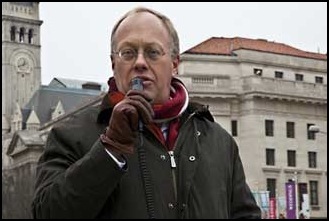
Bringing these two great journalists together for five hours proved one thing to me, something I already knew, but the confirmation is nice: Mumia Abu-Jamal, the journalist, the writer, the historian, can play on an even playing field with anyone, even giants. That is why his voice must continue to be heard, continue to reach around the world. It's like what former US Attorney General Ramsey Clark says in "Long Distance Revolutionary" - "Mumia’s words should be taught to schoolchildren. We’d be a better people and a better country."
This White Madhouse

Written by Stephen Vittoria
(Los Angeles)
From “No Compromise in Copenhagen” to “No Compromise in NYC.”
The same questions keep cropping up about my execution of the film’s narrative: why so radical? Why not offer a narrative that won’t alienate folks who aren’t ready to embrace such a harsh look at the myth and reality of American history? – and how that history targets revolutionaries for love like Mumia Abu-Jamal. One very respectful gentleman asked that question during the Q&A at New York’s great documentary festival, DOC NYC. I answered immediately: “Not for a nanosecond did I consider compromising on telling Mumia’s story as we journey through the very real and very cruel killing fields of the American Empire.” My answer brought to mind this passage from Mumia’s writings that I couldn’t immediately recall for the audience that cold November evening in The Big Apple: "Love is the Force that keeps this Universe—the Omniverse—all that is—in existence. It keeps life alive. It holds atoms in place. It keeps the earth from spinning off into the sun. How could Africans have survived for four centuries in this prisonhouse, this white madhouse, if not for Love?"
Mumia called me on Thanksgiving and we spoke for awhile – spoke about our ongoing work on our book in progress, about the craziness of “celebrating” Thanksgiving (read: genocide and slaughter), and then we addressed this ongoing question of compromise and Mumia remembered a simple but epic quote from John Africa (the founder of MOVE) who said, “Never compromise. To compromise is to admit defeat.” And when Mumia remembered these words, I realized again why Mumia can’t be beat, why he has transcended prison, why – like Lucinda Williams says – we say “thank you to the prisoner who taught us how to be free.” He refuses to compromise… because once you’ve seen the light, you can’t go back – and the freedom associated with knowing the truth can also prove to be a very heavy cross to bear.
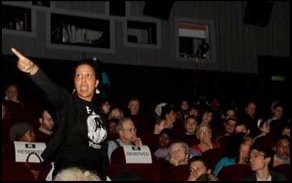
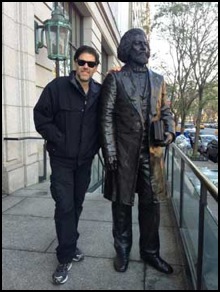
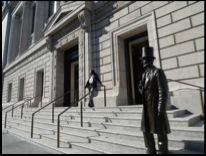
No Compromise in Copenhagen

Written by Stephen Vittoria
(Copenhagen)
I was excited about bringing “Long Distance Revolutionary” to Copenhagen. When we submitted the film to CPH:DOX way back when, Katy Farzanrad and I knew that it was a vibrant, well-attended, and very “plugged-in” festival on the circuit… and it was Europe – a continent and a people that have embraced Mumia Abu-Jamal with open arms since the corrupt swine in this country imprisoned this revolutionary thirty-plus years ago. Like Cornel West eloquently says in the film:
“The state is very clever in terms of keeping track, especially with the courageous and visionary ones, the ones that are long distance runners. You can keep track of them, absorb em, dilute em, or outright kill em – you don't have to worry about opposition to em.”

Our film was sponsored at the festival and our screenings were hosted by Amnesty International… and thank god for Amnesty International in the world – an organization and a movement that has the courage to say the most powerful word in any language to the fraudulent powers in charge everywhere: NO. And it’s a word Amnesty spoke to the cretins slithering around the halls of so-called justice in Pennsylvania when it came to Mumia’s circus of a trial (they said that Abu-Jamal’s original trial “was irredeemably tainted by politics and race and failed to meet international fair trial standards.”) Failed to meet international fair trial standards… in the land of the free and the home of the brave? C’mon, that’s hard to believe. Just like these rabble-rousers who want us to believe that this country was built on genocide, nurtured through slavery, and then evolved through war, murder, and mayhem. Can’t they just be happy like the good folks of Copenhagen? Oh wait, when was the last time Copenhagen slaughtered 3 million Southeast Asians, or hundreds of thousands of Iraqis? Or when did the leader of Copenhagen win a Nobel Peace Prize while bombing the shit out of brown people? Not recently at least. Well, screw all that reality. America is the greatest country on the face of the universe. Cue the F-18 flyover, strike up the Marine band…
Sorry, I digress.
As mentioned, Amnesty International hosted the screening and Trine Christensen was the moderator. Her thoughts about Mumia’s struggle before the film began were inspiring. She would have made a great interview for the film. (Oh well.)
The Empire Cinema in the Nørrebro district of Copenhagen is sort of a revolution itself. Since opening earlier this year, neighboring theatres have experienced a serious attendance drop. It’s easy to see why. The four-screen venue offers a movie experience somewhere between an East Village art house and a post-modern Pathe Multiplex but with serious Danish design. It’s the first new cinema in the capital city in nearly twenty-five years. We were fortunate to screen here… and the audience clearly was intrigued by the film and, of course, by Mumia’s story. We had a lively, substantive, and very political discourse during the Q&A. The American presidential election was fresh on their minds and they were (happily) taken aback by my thoughts on the Empire’s ongoing ruler and CEO – not expecting to hear my critique of his violent actions coupled with his support of predatory capitalism and the corrupt Wall Street swine that enjoy the ongoing free ride.
And then some guy stands up, accuses me of being an intellectual who speaks down to people who don’t share my so-called radical views. He tells me I should reach out and compromise with “that simple guy in Kansas” who loves the ideas espoused by a moron and a tool like Romney. Now, by the way this guy in the crowd frames this fictional Kansas gentleman (let’s call him Toto), I get the sense that Toto’s not very enlightened when it comes to issues of race, war, gender, and sexual orientation. He suggests that it might make the message of my film more appealing – and Mumia more appealing – if I compromised the narrative’s assault on the actions of the American Empire. He suggests that I should meet Toto halfway, that I should understand his point of view, which ultimately may allow him to understand mine. Guy in the Crowd: “Did you ever think of that?” Me: “Uh, no… not for one nanosecond. You’re asking me to compromise with this fictional Joe Blow guy who you suggest is a racist, a warmonger, a misogynist, and probably someone who’s also homophobic. Frankly, we’re in this Neanderthal period of the American experiment because there has been too much compromise, there have been too many olive branches. How do I have a moral conversation with an immoral person? I see no common ground on racism. I see no common ground when trying to justify war. No common ground on economic terrorism. Not for a nanosecond did I consider compromising.”
The audience clapped and the defender of common ground gibberish and hate sat down.
Long Distance Revolutionary is about a man who has maintained the courage not to compromise, not to fall under the spell of concession and middle ground. Some things in life need to be fought for with uncompromising vigor and steadfast commitment. Sometimes you must say “NO.”
To hell with compromise.
STARZ/Denver Film Festival

Written by Stephen Vittoria
(Denver)
I have very mediocre memories of visiting Denver, Colorado.
My only good thoughts regarding Denver are these: Jack Kerouac wrote a few words about it and the 1987 New York Football Giants went to Pasadena and kicked the Broncos ass in the Super Bowl. Phil Simms had the game of his life and Lawrence Taylor was, well Lawrence Taylor was Lawrence Taylor – the greatest linebacker of all time. That’s it. My time in Denver was defined by looking forward to getting out of Denver.
Until now.

The film played, the audience was plugged in. The Q&A went very well and as always, the festival staff had to throw us out to get the next screening ready.
But for me, the highlight of the evening happened as we were walking outside, ready to find a bar, some food, and then another bar. A gentleman walked up to me and had something very important to tell me. I could tell because he was nervous and really wanted to share his thoughts with me about Mumia. Not about the film. Mumia. It turns out Pete worked with Mumia in Philadelphia radio in the late 70s and early 80s. It turns out Pete worked really closely with Mumia in Philadelphia radio in the late 70s and early 80s. And, as it turns out, Pete thought Mumia was the sharpest person he ever worked with in radio. He related a first hand story of Mumia under pressure: a producer breaking into the studio during a commercial break and telling Mumia he had to cut the five-page story written by numerous staff people that was sitting right in front of him ready to air, and instead, air a new one-page condensed version in sixty seconds. GO! Pete said Mumia took the pages and pen, starting ripping, circling, drawing arrows, writing connecting phrases, and hit the air with a perfect one-minute script… and then smoothly passed the baton. Pete says he remembers that moment to this day. He was emphatic: “Hands down, Mumia was the best radio reporter I ever knew.”
My first response to Pete was “Where the hell were you when I was making this film?” What a great story… and what a great moment to recreate in stylized fashion that would really tick off those documentary purists.
Thanks, Pete… and thanks Denver for a great festival. It was an honor to share Mumia’s story with you. And when in Denver, definitely go to a bar/restaurant called Jonesy’s - great food, great wine, and great people.
Now I have some really good Denver memories.
Eddie Vedder

Written by Stephen Vittoria
(Los Angeles)
Like every other creative endeavor on the planet, music is very subjective. So subjective, in fact, that as a filmmaker you have to trust your instincts, your vision (which is blurry a lot as you make a film, especially one you care so goddamn much about). “What do I wanna hear at this point? What makes this cue kick ass?” Some folks are going to say, “Wow, that blew me away.” And others are going to say, “What the hell were you thinking?”
Enter Eddie Vedder.
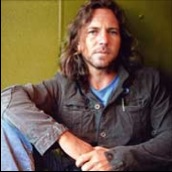
Because at that moment we realize that the story of this long distance revolutionary is about love. Plain and simple, it’s about love. The editor of City Lights Books, Greg Ruggiero, sums it up this way in the film: “I think Mumia would agree with what Che said: "At the risk of sounding ridiculous, a revolutionary is guided by feelings of love and for love of the people.” Once again…
Enter Eddie Vedder.
Because for a film that rages hard like this film rages, in the end it lands soft. It lands with love… and that happens naturally because Mumia’s rage against the machine doesn’t stem from anger. Not even close. It stems from love. Like Greg says, “love of the people.” And so “Society,” written by Jerry Hannan and recorded by Eddie Vedder, is a soulful song, it’s a beautiful song. And I wanted the film to end with a song that sounded like Mumia… what would his soul sound like if we heard it as music? For me, it was about capturing a man at peace with himself in one of the worst places on Earth. At peace because he’s right, because his fight has always been right…
Society, have mercy on me
I hope you're not angry if I disagree
Society, crazy and deep
I hope you're not lonely without me
Here’s a clip of Eddie Vedder singing “Society” live.
Lakota Harden

Written by Stephen Vittoria
(Los Angeles)
Lakota Harden was one of my favorite interviews during the entire process of making LONG DISTANCE REVOLUTIONARY – and she doesn’t appear in the film. Sometimes this happens… great moments end up in digital purgatory (used to be the editing room floor).
Lakota Harden is an orator, activist, community organizer, radio host, and poet. She has dedicated her life, as a daughter of seven generations of Lakota leaders, to liberation and justice. Lakota first became an accomplished speaker as a youth and representative of the early American Indian Movement's “We Will Remember” Survival School on the Pine Ridge reservation, which was established out of the 1973 Wounded Knee occupation. She has continued her activism over the years, working with the International Indian Treaty Council, Women of All Red Nations, and the Black Hills Alliance.
Lakota has been inspired by the life and revolutionary writings of Mumia Abu-Jamal. She remembers the first time she heard his voice and his words on her car radio and having to pull off to the side of the road. She cried… and this didn’t end up in the film. One of the great screenwriters of all time, William Goldman, has written about the unfortunate phenomenon of a great moment not making it into the final cut of the film. This is one of those instances. But the home video version of this film will include Lakota – as much as I can get in because she’s great, and powerful, and important to people who care about justice everywhere. Here’s a great example of Lakota… and it’s a rough cut… and it’s a rough cut edit… and as I watch this piece, I’m asking myself: How did this not end up in the film???
Peter Coyote

Written by Stephen Vittoria
(Los Angeles)
Okay, I’ve worked with many outstanding narration actors and actresses, but after working with Peter Coyote I reached this conclusion: there’s Peter and then there’s everyone else. Kind of like Eddie Vedder’s voice – there’s Eddie and there’s everyone else.
For LONG DISTANCE REVOLUTIONARY, I had this idea that the storytelling narration of the film should be done onscreen and by an ensemble cast of really good performers. It’s not really a practice we see in many documentaries. Critics and naysayers may knock the technique as being overly dramatic or manipulative because they want their docs to be “objective.” Well, here’s the rub when it comes to so-called objectivity in any creative endeavor and journalistic undertaking: it doesn’t exist. It’s a myth. Hunter Thompson told me one time that objectivity exists in two instances: obituaries and baseball box scores… and then he said, “Bullshit. It doesn’t exist anywhere. Fuck me. And fuck you for not questioning me.” Gonzo at his best.
I gravitated to the dramatic onscreen narration because I wanted to bring Mumia’s brilliant and searing words to life. And since I couldn’t film or record Mumia in-person, I had to rely on great people… like Rodney Charles, Christina Moses, Eartha Robinson, Rachel Hastings, Elijah Hall, Howard McNair, and Sheila Grenham who brought Mumia’s words to life – lifted them right off the page and drove it home, delivered the mail, made it real.
But back to Coyote. We filmed Peter in the KPFA radio studios in Berkeley and the passages I reserved for Peter was the narration I wrote to carry the story forward – some of it straightforward, some of it with piss and vinegar. Well, Peter does these things in one take and does them with perfection. You say “action” and Peter makes your words sound great and sound right. He makes you a better writer when he interprets your words, your phrasing, and then nails it. Here’s an example…
Finding Mumia Abu-Jamal

Written by Noelle Hanrahan
(Philadelphia)
In the winter of 1992, I was looking for a voice from America’s death row. My search took me to lock down units on the largest death rows in the country: California, Texas, Virginia, and Pennsylvania. I was seeking a perspective that would illuminate the harrowing places where men and women wait to be ritually killed at the hands of the government. This voice would bring into focus and breathe life into numbing words and dry statistics – capital punishment, gas chamber, solitary confinement, corrections, and mass incarceration.
Here I was, a young reporter, trying in the best tradition of investigative journalism to cover the story. I was asking a simple question: what does this all mean? Prisons in the United States are an epic story. Mass incarceration and the jailing of one in forty-six people during their lifetime (one in three for Black men) is culturally defining. As a broadcast journalist I needed a voice on the ground, someone who had lived this experience. I needed someone to share with the audience what it means for a country to never quite let go of its slavery.*
Clearly, racism was driving U.S. carceral policies; by the early 90s slavery was back.
Could a country incarcerate the most people per capita on the planet, employ the death penalty with ferocity, and incarcerate a generation of young black men, without experiencing devastating economic and spiritual consequences? Prisons verses preschools is not a slogan: it is a choice.
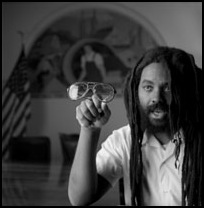
For more than a decade, Mumia’s voice had been silenced. He was a journalist trapped in solitary confinement on death row – his melodic silky baritone, extinguished. Mumia Abu-Jamal began his career in journalism in 1969 as a writer for the Black Panther newspaper. Throughout the 1980s, he was a prominent broadcast journalist in Philadelphia. Like many Black men of his generation, he entered prison, arriving at Graterford in 1981.
In July 1992, I handed Mumia Abu-Jamal a microphone and his broadcast career resumed. These were his first radio broadcasts since he was shot and arrested. For a few hours on that hot summer day in rural Pennsylvania, Mumia was back in a funky old recording studio… even the thick Plexiglas separating talent from engineer was the same. The only difference was the heavily armed guards and his tightly shackled wrists.
For the last two decades we have produced weekly broadcasts. I have found Mumia’s perspectives searing and profoundly illuminating. He tackles the vast implications of incarceration head on. And his delivery is unique and compelling. I often relate that he has the vocal talent of James Earl Jones, though trapped in a concrete box. He is a world class broadcast journalist. But beyond the talent, and brilliant writing, he also infuses each essay with a profound humanity and respect for his subjects.
Such a compelling belief in the poor runs counter to the government’s right wing narrative. It is also a perspective that would not go unnoticed and unpunished. Battling and breaking through the censorship of Mumia’s voice has been a tremendous fight. As Mumia states, “The state would rather give me an Uzi than a microphone.” And as Mumia would say: keep listening, keep rumbling, and take this journey with us. You can start by going to see the film or bringing it to your town.
Noelle Hanrahan, founder of Prison Radio, is a producer on the Street Legal Cinema production “Long Distance Revolutinoary: A Journey With Mumia Abu-Jamal.”
*Thirteenth Amendment to the U.S. Constitution. Neither slavery nor involuntary servitude, except as a punishment for crime whereof the party shall have been duly convicted, shall exist within the United States, or any place subject to their jurisdiction.
http://en.wikipedia.org/wiki/Incarceration_in_the_United_States
The Conversation

Written by Stephen Vittoria
(Los Angeles)
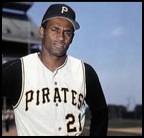
Nat Turner

Written by Stephen Vittoria
(Los Angeles)
When I think about why I made this film, this passage from Mumia’s writings invariably comes to mind. I think it captures his deep compassion and love for those living under the oppressive weight of tyranny. In fact, the beauty that emanates from this man who has also lived his life under the oppressive weight of tyranny is incredible. Dig it…
"Here and there in the barrios and the favelas, among those who have least, beat hearts of hope, fly sparks of overcoming."
His gift as a journalist, as a writer, and now as a historian is his innate ability to focus our attention on the core essence of a subject or a person. Here’s a great example: check out this clip from “LONG DISTANCE REVOLUTIONARY” as Mumia evokes the spirit of Nat Turner, who was executed by the State on November 11, 1831. Turner’s body was then flayed, beheaded, and quartered. God Bless America.
Aya de Leon

Written by Stephen Vittoria
(San Francisco)

Well, we’re fortunate because Aya graces and dignifies LONG DISTANCE REVOLUTIONARY with her insight, passion, as well as another remarkable performance, this one from her own spoken word poem entitled “In the Flesh.” She’s accompanied on vocals by Ahsabi Monique Burris in this haunting moment. Take a listen…
Also, Aya will be attending the second screening of LDR at the Mill Valley Film Festival on Monday, October 8 at 4:45pm. There will also be a Q&A after the film with myself and Noelle Hanrahan. (Sequoia Theatre, 25 Throckmorton Avenue, Mill Valley, CA 94941). If he can, Mumia will be calling in live..
Michael Parenti

Written by Stephen Vittoria
(Los Angeles)
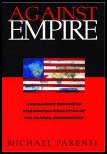
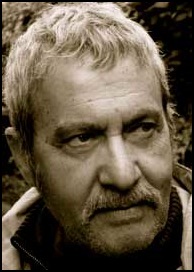
This clip didn’t make it into the film, but like a lot of clips that didn’t make it into the film, it’s a great piece. Michael offers some great tongue-in-cheek fun with regard to torture and human rights abuse. See, even torture can be fun and games if you just lighten up… just ask your government and sweethearts like Charles Graner and Lynndie England. C’mon, take that taxi to the darkside.
San Francisco

Written by Stephen Vittoria
(Los Angeles)
San Francisco (and the entire Bay Area) holds a very special place in the life of “Long Distance Revolutionary.” And not just because we interviewed a number of extraordinary people in the Bay Area, that’s the practical reality, but really because the spirit of San Francisco runs through the film like a main circuit cable.
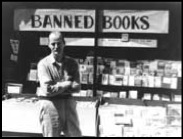
The beats evolved into the counterculture movement of the mid-sixties that was thriving in San Francisco and it was ground zero for a revolutionary movement that was taking on a world of corruption – social and political… and it was this rumble that a young Wesley Cook aka Mumia would hear in a racist hot bed of corruption known as “the City of Brotherly Love.” The late, great Hunter S. Thompson captured the spirit of San Francisco in the mid-sixties with grace in Fear & Loathing in Las Vegas – a truly remarkable passage:
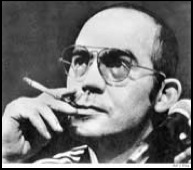
In the film, Rubin Hurricane Carter says that Mumia “is one of the lost souls of the revolution” – and I think that encapsulates Mumia best: like Hunter wrote above, Mumia has the right kind of eyes to see the spirit, see the love, see the change. After all, there cannot be change without the vision of change first… and Mumia has never stopped believing in and fighting for change. Indeed, as Carter declares – “a lost soul of the revolution.” While almost every soul of that historic revolution has sold out, compromised, thrown in the towel, or became a ratfink, Mumia (under harsh and inhuman conditions) has continued the battle for freedom, justice, and the un-American way.
And so have some of San Francisco’s (and Oakland’s, and Berkeley’s) favorite sons and daughters… and we were fortunate to capture their brilliance in “Long Distance Revolutionary.” At the Ella Baker Center, we interviewed Angela Davis. Also in Oakland, we interviewed science fiction master and Mumia biographer Terry Bisson. In Berkeley we sat down with Michael Parenti at his home and with poet Aya de Leon on Berkeley’s campus. In San Francisco we spent a great morning in Emory Douglas’s painting studio and then some time with publisher and writer Ted Nace as well as the Native American activist Lakota Harden. And finally, we traveled just north of Baghdad by the Bay and we filmed a remarkable interview with the inimitable Alice Walker.
Clearly, the spirit and the people of San Francisco mean a great deal to the essence and spark of this film, so it’s fitting that our world premiere takes place in the Bay Area at the 35th Annual Mill Valley Film Festival on October 6 at 12:00 noon at the Rafael Film Center (California Film Institute) in San Rafael. With the right kind of eyes (and some tickets), you can see the “inevitable victory over the forces of Old and Evil.”
Angela Davis

Written by Stephen Vittoria
(Los Angeles)
Angela Davis frames the ongoing systemic injustices of current-day America this way: “The challenge of the twenty-first century is not to demand equal opportunity to participate in the machinery of oppression. Rather, it is to identify and dismantle those structures in which racism continues to be embedded. This is the only way the promise of freedom can be extended to the masses of people.”
Recognizing and deconstructing the inhuman edifices of institutional racism has been the historic target of Angela Davis’s revolutionary drive for more than forty years. A kindred spirit with Mumia since their days of fighting the good fight with the Black Panther Party, Angela’s writings and sharp analysis aimed at building resistance to the corrupt machine are as relevant and inspired today as when she was writing insurrectionary essays from the Marin County Jail in 1971. Her vision and spirit continues to inspire people the world over, people who care deeply about achieving economic justice, personal freedom, and lasting peace in this violent and ruthless system.
Angela graced our film LONG DISTANCE REVOLUTIONARY with her powerful thoughts about the night side of American history and, of course, Mumia’s role in documenting the victories and defeats of freedom and justice in that history. Angela also documents with precision Mumia’s place in the pantheon of Black writers and historians who have courageously spoken truth to power throughout the American experiment. Here’s a clip that’s not in the film… Angela talks about the Panthers, Frank Rizzo, and the racist repression associated with the so-called City of Brotherly Love.
Contact

Written by Stephen Vittoria
(New York)
Up to this point, every visit with Mumia has been extraordinarily memorable even though he was encaged in a sterile concrete box and presented behind a giant sheet of Plexiglas that stands between inmate and visitor… as Mumia has written: “the state-made blockade raised under the rubric of security.” But this time in the waning days of summer, 2012, my visit with Mumia was sans the blockade. No shackles. No Plexiglas. No muffled sound. Contact. Flesh against flesh.
I left Manhattan and cut my way across the Garden State in a rented car with my beloved New York football Giants on the radio. I was chasing the sun into Pennsylvania, planning to spend the night in Frackville – an old railroad town dating back to the area’s coal mining days… a sleepy settlement about fifty miles northeast of Harrisburg.
I was looking forward to visiting Mumia. I wanted to bring him up-to-date on “Long Distance Revolutionary” (although we correspond via mail all the time and less frequently by phone) but more importantly, we had to discuss the book we’re writing together entitled “Murder Incorporated: Empire, Genocide, and Manifest Destiny.” It’s a project we’re both stoked about.
Once in the prison, getting to the visiting area was identical here at State Correctional Institution Mahanoy as it was at SCI Greene, one of the super max crown jewels in America’s prison gulag and Mumia’s last “home” before being transferred here to Frackville in the middle of the night in shackles and leg irons, and of course at gunpoint, in fact numerous guns along with psychological threats. Remember, Charles Graner of Abu Ghraib fame cut his teeth at SCI Greene.
The visiting room is like a large hospital waiting room with tables and chairs, lounging chairs, and a children’s playroom for fathers to spend time with their kids. The guard that ran the admission of visitors announced out loud that I won the award for traveling the farthest today, seeming to spit out the words “Los Angeles” and “Abu-Jamal” with a subtext that was obvious. He asked me if I wanted my prize now or later. I said later. He never mentioned what the prize was but I could guess what he wanted to give me.
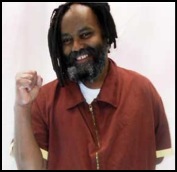
Contact.
The last time I visited Mumia, his dreadlocks were incredibly long and incredibly cool. They just about touched the floor. He cut them to shoulder length as part of a deal with the Department of Corrections, who were holding him in solitary confinement here at SCI Mahanoy for no apparent reason, even though his death sentence was set aside months before. Mumia was scheduled to join the prison’s general population. So, after thirty years in solitary on Death Row, he decided to cut his dreads for a little taste of freedom. And why not… I would have cut them after thirty seconds in solitary.
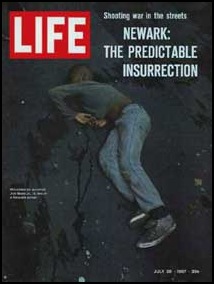
Then the PA System blares: “Pritchart, Wannamaker, Abu-Jamal – fifteen minutes.”
We have a rule, Mumia and I – we never let the fifteen minutes run out so our exit, our departure is on our terms, our decision to end it, not the prison’s… it’s a small victory, maybe really small, but it’s a victory nonetheless. “Love you, man.” “Love you, too, be good.” Our second hug is over. Mumia heads back to hell and I head back to freedom, a rented car, and Interstate 78 stretching east toward Jersey.
Mike Francesa on the FAN ushers me all the way back to Manhattan (love Francesa). During commercials on my iPhone I record my recollections for the book since I can’t take in a pad and a pen to write. I think I got all the major points or close enough.
Next thing I know I’m sitting in the East Village drinking wine, eating a great Italian meal, laughing with friends, enjoying a perfect New York City night… and my mind drifts back to Frackville and Mumia’s simple joy of eating something different than prison food – a sandwich from a vending machine and how much that meant to him… and on the heels of that thought more thoughts: his isolation, his hell, his horrific thirty-year plus existence, and suddenly the wine doesn’t sip as well, the food doesn’t taste as good, and my bourgeois life is on shaky ground… and I find myself hating my freedom because when one of us is wrongly imprisoned, we’re all wrongly imprisoned. When one of us suffers at the hand of state repression, we all suffer. Ultimately, it’s a failure of our collective will.
World Premiere - NOW!

Written by Stephen Vittoria
(Los Angeles)
35th Annual Mill Valley Film Festival
When we started this journey with Mumia Abu-Jamal's tragic but courageous story, we envisioned a day when we could share this story of corrupt state repression with audiences that care and audiences that feel - because from the heart of darkness, which is the nightside of American history (read: tyranny), Mumia Abu-Jamal has transcended the prison walls that bind his flesh with the strength and power and beauty of his words. That's what this movie is about. Redemption. And where does his redemption come from? It comes from the same place that motivates all revolutionaries fighting and raging against the machine - it comes from love, love of the people. "Long Distance Revolutionary: A Journey with Mumia Abu-Jamal" is the definitive documentary on the life and revolutionary times of MUMIA.
Please join us at the world premiere:
Saturday, October 6 @ 12:00 noon
Rafael Film Center (California Film Institute)
1118 4th Street, San Rafael, CA 94901
And/or experience the film on Monday, October 8 @ 4:45pm
Cinemark At Sequoia
25 Throckmorton Avenue, Mill Valley, CA 94941
PURCHASE TICKETS
Long Distance Revolutionary Nabs US Distribution Including Theatrical Release

Written by Stephen Vittoria
(Los Angeles)
Street Legal Cinema is proud to announce that the historic and fiercely independent New York distribution company, First Run Features, has acquired all U.S. domestic distribution rights to my new film “LONG DISTANCE REVOLUTIONARY: A Journey with Mumia Abu-Jamal” and will release the documentary in theatres in early 2013.
First Run was founded in 1979 and the company’s legacy includes films by great filmmakers like Spike Lee, Michael Apted, Rose Troche, Jane Campion, Barbara Kopple, Peter Jackson, Sven Nykvist, and David O. Russell. No doubt, First Run is a survivor in a difficult marketplace. In fact, they’ve even survived FBI probes for distributing content that the US Government considered a threat. Instead, the US Government should probe itself as an ongoing threat to the planet – start with the White House and the corrupt swine on Wall Street. Joe McCarthy still runs through the veins of these-- Anyway, I digress…
In August of 2009, for their 30th Anniversary, First Run was honored with a major retrospective at the Museum of Modern Art in NYC, which the Film Society of Lincoln Center wrote: “First Run Features has been at the forefront of companies that take the risk of distributing previously unreleased films. It takes remarkable courage to distribute cutting-edge and sometimes controversial works that they believe should and must be seen.”
First Run distributed my last feature “One Bright Shining Moment: The Forgotten Summer of George McGovern.”
Stay tuned for updates on LONG DISTANCE REVOLUTIONARY. First Run plans a great release across the country, followed of course by video on demand, home video, broadcast, and so forth – getting Mumia’s story of courage and beauty to as many hearts and minds as possible. Or as the old Hollywood adage goes: “Let’s put as many asses in the seats as possible.” Check out this teaser.
